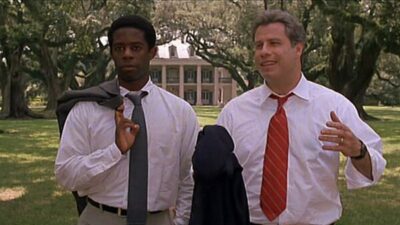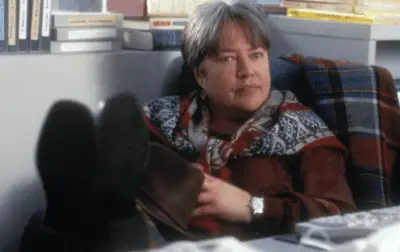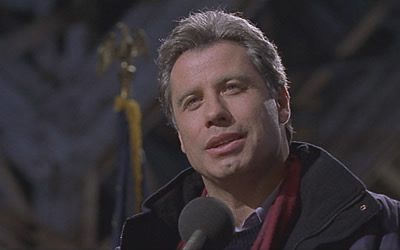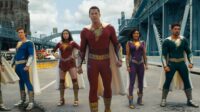Primary Colors premiered 25 years ago. It was an all-star comedy-drama from a great writer and a great director, featuring an insanely talented cast. However, the film isn’t remembered much, which is a shame, because it’s a superb depiction of political campaigning in the 1990s. It also has an unfortunate timelessness that ultimately makes me question why we have politics in the first place.
Before we get into that, though, we need to start with the script, particularly this:
RICHARD: You’ re in the woods taking a shit and a wild boar comes charging at you. Do you pull your britches up and run? Or do you try to pull your britches up, and grab the doves you just shot, and then try to run, all at the same time? Or do you just forget about the doves, pull your britches up, and run, ’cause you got no time to aim and button your fly? And if you miss, you don’t want to die with your dick hanging out. See what I’m saying?
SUSAN: I think I speak for everyone when I say no.
This is one of my favorite moments in all ’90s American cinema. Billy Bob Thornton, as Richard Jemmons, was still riding the wave Sling Blade had given him, especially after winning an Oscar for writing it just a year before Primary Colors premiered. He nails this scene, and Emma Thompson (as Susan Stanton) somehow manages to one-up Thornton with that line.
Obviously, no disrespect to Thornton and Thompson, but we have Elaine May to thank for this exchange, as well as director Mike Nichols. They truly were a dynamic team, weren’t they? It’s a shame they didn’t do much together in film. Not to mention, given Nichols’ death in 2014, Primary Colors would be their final film collaboration, as well as May’s last film script.
It should be noted that, despite the acclaim, the film received only two Oscar nominations: May for Adapted Screenplay and Kathy Bates for Supporting Actress. I’ll get to Bates eventually.
Primary Colors was based on a novel by writer Joel Klein. Originally, the author of the book was Anonymous, but after enough people put it all together, specifically Klein’s writing style, he admitted to writing it. May pretty much sticks to the overall plot, but she injects enough wit and human observation into her script to make it her own.
See, this is one of those kinds of movies that I love. It’s dialogue-heavy with actors taking center stage. And, thankfully, Nichols does the smart thing and just lets both of those features shine, rather than utilizing fancy filmmaking tricks. I mean, don’t get me wrong. I love a moving camera, flashy editing, and a score that transcends the film it’s supporting, but all of that has its place.
Sometimes, a filmmaker must gather elements together and then just sit back and start shooting. For a film like Primary Colors, this was indeed a smart decision.

Before I just devolve into straight-up gushing over May’s screenplay, let me add a few more things. Yes, the dialogue is wonderful, but we know this isn’t shocking, given May’s start in the theater. (In fact, this could also be said about how Nichols approached making a film.) Yes, the story is interesting, but it also came from a book that was supposedly based on real events.
I don’t want to suggest that the dialogue and story didn’t require the talents of May, because of course they did. It’s not easy to write dialogue this good, and even though it can appear that adapting previously published material is easy, one has the task of translating over 500 pages of text into a 120-page script. Those two things aren’t even the most impressive part, though.
The most striking thing about the screenplay is that she manages the task of taking something that was clearly of its time and making it timeless. The result is unfortunate because the politics and its surrounding culture haven’t changed much in 25 years.
Most would generally agree that politicians do whatever it takes to win, whether it means posturing or lying. In the film, Henry Burton (played with gentle decency by Adrian Lester) is a young political idealist who is sort of forced into joining the presidential campaign of Jack Stanton (played pitch-perfectly by John Travolta).
At first, Burton is quite taken with Stanton, and given Stanton’s rhetoric and charisma, so are we. This is even after we see him exiting his bedroom with a woman other than his wife in the suite of the hotel where his staff is working hard on his campaign. Over the course of the film, though, it’s clear that Stanton is just another politician. The main thrust of the final act involves Burton taking part in something that nearly breaks him.
It’s the last straw, and the film asks the question, “Even if a politician is full of it if they’re on the side of things you believe in, is it worth it to help them succeed?”
For me, it’s a no. I could never work for someone’s political campaign because I’m just jaded enough to not believe anyone who goes into politics is decent enough to not be a politician. I can recognize certain members of congress are decent, whether I agree with their politics or not, but on the whole, I think, perhaps, a film like Primary Colors shaped the person I am today.
I came of age when Bill Clinton was in office, and Jack Stanton is obviously supposed to be Bill Clinton. There wasn’t much internet access for me during this time, so I had mostly TV, magazines, and newspapers as places to get my information. As such, I was led to believe Clinton was a smooth talker, a man who cheated on his wife, and a president who did his best for the American people.
He was a Democrat, and I found myself gravitating toward that. I suppose I tended to focus on the positive stuff because of this, though to be fair I was between the ages of 8 and 16 when he was president. Still, when I see people fight so hard for someone running for congress or the presidency despite something horrible they’ve said or done, I wonder how they can do that.
The ’90s were one thing, but thanks to the internet, there’s so much information available now. How can we continually elect people like Stanton? I think about Burton’s choice at the end. Here is a man who has a front-row seat to the happenings of Stanton’s campaign, but even he sticks around. Why?
It goes back to an exchange early in the film between Burton and Susan. She asks him, “So, why are you here?” This is his response and their exchange:
BURTON: I wondered how it would be to work with someone who actually cared about… I mean… It couldn’t always have been the way it is now. It must have been different in my grandfather’s time. You were there. You had Kennedy. I didn’t. I’ve never heard a president say “destiny” and “sacrifice” without thinking, “bullshit.” Okay, maybe it was bullshit with Kennedy, too, but… but people believed it. And I guess, that’s what I want. I want to believe it. I want to be part of something that’s history. I bet this is the longest answer to a five-word question you’ve ever gotten.
SUSAN: No, it isn’t… It’s a good answer, Henry. We are part of a history.
It makes sense that it’s actually her that keeps Stanton hanging around for the majority of the film. Jack is the man out front, shaking hands, smiling, being charming, and saying the things that need to be said in order to get votes. Is it possible that Susan isn’t full of it?
That’s tough. We know that she gets hurt by Jack’s actions, but we also know that she’s willing to play the game in order to stay in the race. One moment in the film says it all. After an interview where she makes it clear that she’s standing by her husband, we get a close-up of their hands firmly held together. Once the interview ends, she lets go.
Emma Thompson is great as Susan, but Thompson is always great. Still, she manages to let us see the layers in Susan. With Jack, we get the impression that he cares, but at the same time, he’s a cheater. I suppose I can understand his actions as a politician. What I will never understand is cheating on one’s partner.
What I do understand is Susan also doing what it takes. In a sense, she’s running for office with him, so she has to be full of it sometimes, too. What I don’t understand is why she feels the need to. Susan could’ve left the cheating bastard behind. She doesn’t, though. Burton witnesses this.
We know why he joins the campaign. Why, though, does he stay?
I suppose the answer has less to do with Jack or Susan and more with the character that earned Kathy Bates her second Academy Award nomination.

Libby Holden is an old friend of the Stantons, and she’s brought in to investigate the allegations of sexual misconduct laid against Jack. Bates plays her the only way Bates could, with a strength that radiates through the screen. You want Burton to team with her because she’s the one person in the film that gets it. She’s not cynical. Libby is a realist.
Primary Colors would have you believe that Libby is an idealist. She has her ideals, true, but it’s more than that. She recognizes how politics work, and she’s willing to face the mudslinging without even objecting that her face will get dirty. It’s how things work. That said, she has too much of a conscience to fully play the game, but she’s a participant, nonetheless. And a damn good one, too.
There are things that need to be done sometimes in political campaigning, even if they hurt others. The idea is that everyone is out to destroy their opponents, and it does little to try to be above it. I see this still whenever elections come around, particularly in the last decade or so. Attack ads aren’t even attack ads anymore. They’re standard operating procedure. In fact, for me, the ads that stand out tend to be the ones that focus on the candidate and their stance on issues.
Burton has met the Stantons and seen both their public and private faces. He’s met Richard Jemmons, a campaign strategist who exposes himself to a female staffer in the middle of the campaign headquarters. He’s seen the lies and the spin doctoring. Now, here’s Libby, who doesn’t bother to sugarcoat anything. She says it like it is. It’s refreshing to Burton and the audience at this point in the film.
Now, whenever I look back on movies from over two decades ago, the obvious thing that tends to stick out is the technology. In this sense, Primary Colors is very much a ’90s movie. Sure, there are cell phones present but not texting. We see electronic datebooks but no smartphones.
Yes, there’s a sequence involving recording someone’s voice without permission and then editing their words to make them say things they (probably) didn’t say, but it’s treated by some as something mind-blowing. Nowadays, we have deep fakes, a phenomenon that’s just getting started.
This movie doesn’t dismiss any of this technology. Even in the ’90s, it was understood that for political campaigns, technology was important and would probably end up being essential. The sequence I mentioned above exists for two reasons: first, it shows characters and the audience what technology is capable of; and second, it shows how it will be an obstacle to overcome.
Libby and Burton find ways to approach technology in the film which makes me wonder what they’d do in the age of social media. It’s one thing to set up their little demonstration on Larry King Live (a show that is long gone), but what would they do nowadays? I’m genuinely curious, but I haven’t the answer.
The point is, Libby is able to fight the allegations. This is one thing. Where she draws the line is when she and Burton find dirt on Jack’s opponent, and Libby tries her damnedest to make the case that they do not use it. It’s too much, and it’s too heartbreaking.
In a powerful scene in the film’s final act, Burton watches as Libby tries and fails to convince both Jack and Susan to not use the information. I repeat both decide to use it. What follows is also devasting to me. Libby commits suicide because she’s realized that Jack and Susan are not the great people she always believed there were.
Libby removes herself from the equation, albeit in such a drastic fashion. But, again, why does Henry Burton stay?
In the film’s final scenes, Burton and Jack have an exchange that seems to suggest that Burton is out. He’s done with politics. Jack does his best to get him to stay. He tells him:
You know that there are plenty of people in this game who don’t think that way. They’ll sell their souls, lie to people, divide them, play on their fears, for nothing. Just for the prize.
Henry still wants out, but Jack keeps on:
Don’t shake your head, Henry. We worked so hard together to get here. It’s there for us now. We can do incredible things. We can change this whole country. I’m going to win this. And when I do, we’re going to make history. Look at me and tell me it’s not going to happen. Look at me and tell me you don’t want to be part of it.
The next thing we see is Jack. He’s the president now. The campaign worked. We see a few familiar faces shake his hand, and the last one is Henry Burton. The music is melancholy. There’s a fade to black, and then the end credits roll. We’re never directly told why Burton stays.
It might have something to do with an exchange Burton has with his former romantic partner, March, around 40 minutes into the film:
MARCH: He’s a politician…You want to work for that?
BURTON: No, I want to work for a man who fights for what’s right and watch a Republican get elected.
MARCH: Do you know the difference?
BURTON: I know the difference between a man who believes what I do and lies about it to get elected and one who doesn’t give a fuck.
Fair enough, I suppose, but that’s near the middle of the film. The character is still on his journey.
I have my own thoughts on this. The reason Burton stays is that he finally comes to understand that politics are what the government is. One can see the system and see mechanisms that can help people. And this can be true. To be able to utilize these mechanisms, though, one has to play the game of politics. Depending on the players, a game can be relatively honest or dirty.
The game is always there, though. By the film’s end, he understands this, and he knows that it’s ultimately about who has the best chance to win. Sure, this person can stand for similar things you believe in, but it’s ultimately about winning. Once that happens, it’s an entirely different game in trying to make things better.
Thankfully, this film is solely about political campaigns. Focusing on anything else would be too much, even given its 143-minute runtime.

Primary Colors seems to be about understanding why politics works the way it does. After all, shouldn’t the best person for the job win? Why do anything other than stances on issues and plans for the country matter? Nichols and May don’t answer these questions. Instead, they present the world of politics as it was and, unfortunately, still is.
Sure, it’s funny at times. I doubt the real person Richard Jemmons is based on could give that analogy I quoted at the beginning as well as May wrote it. This is also a studio picture. It was an R-rated, $65 million-dollar prestige film for Universal Pictures. Though it didn’t make a lot at the box office, it still managed to make an impression during an awards season that had Shakespeare in Love, The Truman Show, Saving Private Ryan, and The Thin Red Line, among others.
Overall, Primary Colors a film that addressed the politics of its time. It’s unfortunate that things haven’t changed much. Am I more jaded after having given this film the first rewatch in over ten years? I’m unsure, and that already says a lot. Politics aren’t going anywhere anytime soon. Still, it’s sobering to be reminded from time to time that politics involves a lot of choices.
No one is forced to run for office. As such, no one is forced to play the game in order to win. Does this mean we can judge those who do? Like the film, I don’t have all the answers. Perhaps it’s enough to just be able to ask the questions.




